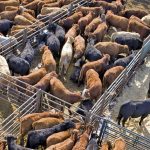Prairie hog producers are already thinking about how to fight the next trade battle with the United States, even as the victory cheers from the recent battle still echo.
They hope that next time anti-Canadian interests don’t catch the Canadian industry unprepared, unco-ordinated and unco-operative.
“In the future we ought to work much closer with our counterparts in the U.S. to prevent actions like this coming again against Canada,” said Ab Freig, whose company, Puratone, is a major hog exporter to the U.S.
Read Also

VIDEO: Catch up with the Western Producer Markets Desk
The Western Producer Markets Desk provides daily updates on agricultural markets, with recent video commentary including looks into canola, wheat, cattle and feed grains.
He spoke April 6 shortly after the U.S. International Trade Commission voted 5-0 against maintaining antidumping duties on Canadian pigs.
“We should never let our guard down and never feel that this is it and that there will never be another challenge. We know there will be.”
Manitoba Pork Council chair Karl Kynoch said victory celebrations won’t distract Canadian producers from realizing their industry faced a crippling blow they were fortunate to avoid.
“Just because we’ve won this case doesn’t mean that this is over,” said Kynoch.
“The one thing that we have to do to move forward in our industry is to get a better understanding of the issues both in the U.S. and in Canada.”
The ITC’s decision probably ends this particular complaint against the Canadian industry.
The U.S. National Pork Producers Council, which launched the countervailing and antidumping investigation, can appeal the rulings, but many observers doubt that it will do so after the 5-0 victory for Canada.
The U.S. hog group’s claim that Canadian hog farmers receive illegal subsidies was rejected earlier this year, but an initial duty of 14 percent, later reduced to 10.63 percent, was levied against most Canadian hogs entering the U.S. because of a preliminary ruling that Canadian hogs were being dumped into the U.S. market.
The April 6 ITC ruling dropped the duties because it decided Canadian imports were not causing injury to American producers.
Washington, D.C., lawyer Dan Porter, who represented the Manitoba Pork Council in this dispute, said another countervailing petition is unlikely to succeed unless Canada creates subsidy programs for hog farmers.
But another antidumping case could work if pig prices drop below the cost of production, because U.S. interests need to prove only that foreign goods are being sold unprofitably and causing damage to U.S. producers to win.
“You can almost always show dumping, especially if you time the case to capture a down part of the cycle,” said Porter.
Hog prices almost always fall below break-even levels every four years, in a predictable cycle.
Porter recommended Canadian producers work with American weanling and slaughter hog buyers in the U.S. so they will be willing to fight against trade actions from inside the U.S.
“Educate your customers about the process so we can stop this from the get-go,” said Porter.
In this case, the U.S. hog group launched the action and got dozens of state pork producer organizations to support it before they realized it worked against some of their members’ interests.

















